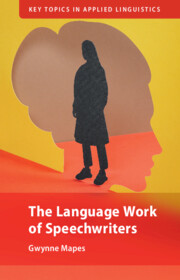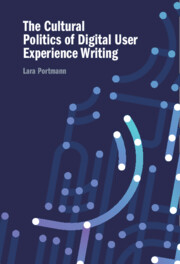Refine search
Actions for selected content:
11 results

The Language Work of Speechwriters
-
- Published online:
- 31 October 2025
- Print publication:
- 14 August 2025
1 - Introduction
-
- Book:
- The Language Work of Speechwriters
- Published online:
- 31 October 2025
- Print publication:
- 14 August 2025, pp 1-35
-
- Chapter
- Export citation
6 - Reappraising Language Work
-
- Book:
- The Language Work of Speechwriters
- Published online:
- 31 October 2025
- Print publication:
- 14 August 2025, pp 162-182
-
- Chapter
- Export citation
3 - Skilling the Writer
- from II - Establishing Status
-
- Book:
- The Cultural Politics of Digital User Experience Writing
- Published online:
- 24 July 2025
- Print publication:
- 07 August 2025, pp 57-83
-
- Chapter
- Export citation
2 - Designing Words
- from I - Mapping the Profession: The Language Work of UX Writers
-
- Book:
- The Cultural Politics of Digital User Experience Writing
- Published online:
- 24 July 2025
- Print publication:
- 07 August 2025, pp 29-54
-
- Chapter
- Export citation
7 - The Cultural Politics of the Interface
- from Conclusion
-
- Book:
- The Cultural Politics of Digital User Experience Writing
- Published online:
- 24 July 2025
- Print publication:
- 07 August 2025, pp 161-183
-
- Chapter
- Export citation
1 - The Production, Pragmatics, and Politics of Digital Media
- from Introduction
-
- Book:
- The Cultural Politics of Digital User Experience Writing
- Published online:
- 24 July 2025
- Print publication:
- 07 August 2025, pp 3-26
-
- Chapter
- Export citation
4 - Claiming (Non-)Creativity
- from II - Establishing Status
-
- Book:
- The Cultural Politics of Digital User Experience Writing
- Published online:
- 24 July 2025
- Print publication:
- 07 August 2025, pp 84-108
-
- Chapter
- Export citation

The Cultural Politics of Digital User Experience Writing
-
- Published online:
- 24 July 2025
- Print publication:
- 07 August 2025
3 - Alienation, Language Work, and the So-Called Commodification of Language
- from Part I - Theoretical Orientations
-
-
- Book:
- Language Politics and Policies
- Published online:
- 18 July 2019
- Print publication:
- 18 July 2019, pp 60-77
-
- Chapter
- Export citation
Part I - Theoretical Orientations
-
- Book:
- Language Politics and Policies
- Published online:
- 18 July 2019
- Print publication:
- 18 July 2019, pp 25-94
-
- Chapter
- Export citation
